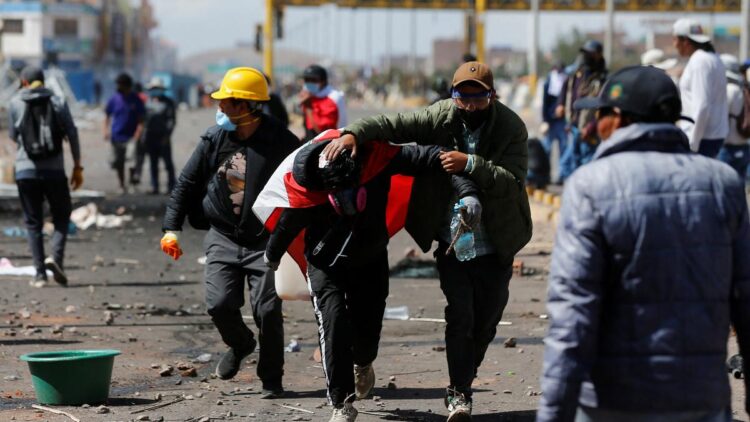
A demonstrator assists an injured man during a clash with security forces, demanding early elections and the release of jailed former President Pedro Castillo, near the Juliaca airport, in Juliaca, Peru January 9, 2023.
| Photo Credit: Reuters
Peru’s political crisis deepened on Tuesday as a police officer died torched in his car after 17 civilians were killed in protests a day earlier, all triggered by the ouster of President Pedro Castillo last month.
The slain officer’s vehicle came under attack early on Tuesday morning by “unknown persons” in the city of Juliaca, located in the southern Puno region, with another officer suffering multiple head injuries, according to the interior ministry.
Jorge Angulo, a senior ministry official, told local media officials were seeking more information into the grisly attack.
“At this moment, an autopsy is being performed to fully identify the form and circumstances in which he was injured, practically burned to death,” Angulo told broadcaster Canal N.
Editorial | Cycles of crises: On the executive-legislature clash in Peru
A three-day mourning period kicked off in parts of southern Peru on Tuesday, including Puno, after 17 people were killed on Monday in the most violent day of protests since the leftist Castillo was ousted by lawmakers after he illegally sought to dissolve Congress.
In a bid to formally kickstart the new government, Prime Minister Alberto Otarola appeared in the opposition-dominated Congress, asking lawmakers to approve a vote of confidence for the cabinet of President Dina Boluarte, which is needed to lead a new government.
At least 40 people have been killed in the unrest so far, as supporters of Castillo insist he was the victim of a coup and demand his release from jail and Boluarte’s resignation.
Otarola blamed organized attackers financed by “dark” money for those killed on Monday. Beyond the deaths, another 68 civilians and 75 police officers were reported injured, according to the state ombudsman.
Later on Tuesday, the Prime Minister announced a three-day overnight curfew in Puno, aimed at quelling the violence.
Footage from local media showed looting of Puno businesses on Monday night, while the Juliaca airport remained shut on Tuesday.
Castillo has been ordered to stay in pre-trial detention while he is investigated for fomenting rebellion, a charge he denies.
The former rural teacher insists he remains the country’s lawful President.
On Twitter, Castillo wrote that those killed for “defending the country from the coup dictatorship” will never be forgotten.
Later this week, an Inter-American Commission on Human Rights mission will visit Peru to assess the situation, while in a separate statement, the United Nations urged respect for human rights and offered to mediate the crisis.
















